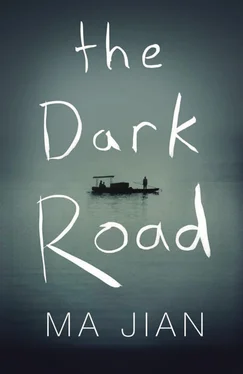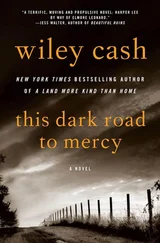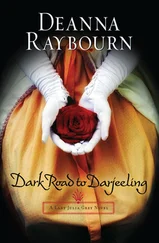‘Thank you, Master Kong,’ says Dai, a gentle man with large bulbous eyes and a deeply lined forehead. ‘Me and Yiping are simple peasants. It’s an honour for us to share a drink with a schoolteacher! A toast to your daughter, Master Kong!’ Dai grits his teeth and forces himself to down the drink in one. He and Yiping are from Purple Mountain in Jiangsu Province. They moved to the sand island six weeks ago, and have built a shelter under the trees just behind. Meili came across them over in the town. Dai was wandering through the streets with a pole on his shoulders, a bucket of clothes and pans on one end and a cotton fluffer for quilt-making on the other. Yiping, half his height and heavily pregnant, was waddling behind him holding their two daughters by the hand. Meili approached them and advised them to move to the island to avoid being arrested by family planning officers.
A skinny, bald man called Bo lifts his glass and says, ‘Drink, drink!’ his scalp and bony shoulders gleaming under the strip light. His fingernails are black and broken from scavenging the rubbish dump. He and his wife have three daughters and a four-month-old son.
Kongzi has fried some chicken wings and Meili has made a salad of wild wood ear fungus. Smells of garlic and sesame oil drift from the men’s faces as they tuck into the food. A gaggle of children run up, grab some chicken wings, then go to chase each other along the river’s edge. Chen arrives in his boat, tethers it to a rock and climbs the sandy beach. ‘So you still manage to remember birthdays on this island!’ he says to Kongzi, clapping his hands. ‘Ha! We haven’t remembered our kids’ birthdays for years.’ He puts a bag of deep-fried meatballs onto the wooden crate. When he laughs, exposing his black and yellow teeth, he looks like a monkey.
‘My daughter and I both have birthdays in November, so I never forget hers, and we always end up celebrating them together,’ Kongzi replies.
Meili and the women are sitting beside them on cardboard boxes, eating rice and braised tofu. The smell of the duck stew simmering on the gas stove outside the shelter makes the breeze feel a little less cold.
‘Have some more, Xixi,’ Meili says, tapping the bowl of tofu with her chopsticks. ‘You’re eating for two, now. And try some of this liver. It’s full of vitamins.’
‘Thank you, thank you,’ Xixi says, buttoning up her angora jerkin and rubbing her small bump. She turns to Yiping and asks, ‘So, when’s your one plopping out?’
‘Not for another four months. But look, my belly’s already so big I can’t see my legs any more. Dai said our padded quilts are too hot for this town. He wants us to go into the mountains and see if we can sell them there.’ Yiping is sitting cross-legged on a mat. With her large belly bulging from her tiny frame, she looks like a sweet potato freshly pulled from the ground.
‘Wait until your baby’s born before you leave,’ says Bo’s wife, a scruffy woman called Juru. ‘You can give birth in the backstreet clinic behind the Family Planning Centre. The midwife only charges three hundred yuan.’ Juru pulls out her breast from under her shirt and stuffs it into her baby’s mouth. When Meili visited her shelter she was shocked by the sodden, mouldy straw on the ground, and advised Juru, for the sake of her baby’s health, to replace it more frequently.
‘Yes, if you set off now, the authorities might arrest you and give you a forced abortion,’ Meili says. ‘Dai should forget about selling quilts and try to find work on the rubbish dump. I’m thinking of buying a hundred more ducks and building a large pen on the beach. I reckon I could make ten thousand yuan a year from a flock that size.’ Meili feels that now that she no longer has to worry about falling pregnant, she can concentrate on building a comfortable life for themselves here.
‘Admit it — you’ve had an IUD fitted, haven’t you?’ Yiping says in the thick mountain accent Meili finds hard to understand.
‘No, no,’ Meili replies, glancing nervously at Kongzi. ‘I considered it, but then realised that if I wanted another child I’d have to bribe a nurse a hundred yuan to remove it.’
‘I’m so stupid,’ Yiping laughs. ‘All I’m good for is making babies. First time I saw a condom, I didn’t know what it was. I thought it might be a piece of tripe, so I plopped it into a soup and ate it!’
‘I wouldn’t dare let anyone put an IUD inside me,’ says Xixi. ‘A neighbour back in our village tried to remove one from his wife. He stuck his hand inside her and groped around for hours, but couldn’t find it. In the end, he got so frustrated he exploded her womb.’ Xixi cringes at the memory, then spits a shard of chicken bone onto the ground.
‘Exploded it?’ Meili says, her mind returning to the dead face of Happiness.
‘Yes, he bunged a firecracker up her vagina and set light to it,’ Xixi says, crossing her legs and wriggling her toes.
‘Men get so obsessed with carrying on the family line, they lose all reason!’ Meili says, glancing at Kongzi again. He’s banging his fist angrily now, shouting: ‘Those fucking officials, turning up here and bombarding us with bloody condoms.’ Two days ago, officers from the County Family Planning Commission came to the island to hand out floating population fertility registration forms and bags of condoms printed with photographs of movie stars.
‘Hope you didn’t swear at them like that when they came,’ Chen says, then licks his teeth. ‘When my brother was locked up in a detention centre last year for entering a city without permission, he swore at an official, and they cut half his tongue off.’
‘I’ve been detained for vagrancy as well,’ Bo says, scratching his bald scalp. ‘If you have money and connections, they let you out after twenty-four hours. But I had nothing. They forced me to labour in the fields for two months, and beat me viciously every day. By the time I was let out, I was skin and bone.’
‘So, what documents do you need to avoid arrest?’ Dai asks, brushing some white cotton fluff from his jumper.
‘Identity card, health certificate, temporary urban residence permit, temporary work permit, birth permit, marriage licence…’ Kongzi says, rattling off the list. ‘But even if you have them all, if you are in a big town or city and you look like a peasant, they’ll still arrest you. And once you’re in handcuffs, they’ll squeeze as much money from you as they can.’
‘They call us the “Three Nos”: no documents, no homes, no income,’ says Bo. ‘When our son’s a bit older, I’ll go and work on a building site. Start living a normal life.’ Bo is in his late forties. A rumour has circulated the island that he spent time in jail for abducting his neighbour’s wife and selling her to a widower in the countryside.
‘No, what they really call us is “blind vagrants”, aimless drifters,’ says Chen, a foolish smile spreading across his face. The Western suit he’s wearing is thin and torn. He’s making good money now, hauling cargos of oranges up the river several times a week.
‘To think that it’s now a crime for us to live in our own country!’ Kongzi cries out, his face red from alcohol. ‘Where do they expect us to go?’
‘Keep your voice down — you’re not in a classroom now,’ Meili says. She looks over towards the town. An old warehouse behind the rubbish dump has been renovated and turned into the Earthly Paradise Nightclub. Its bright neon lights outshine the ones of the Eastern Sauna House above. People walk past and gaze up in wonder. A motorbike stops outside the entrance, and a smartly dressed couple climb off the back seat and become engulfed by children selling roses and chewing gum. Nearer the jetty, a crowd is wandering aimlessly outside a second-hand stall which is lit by a bright bulb. Meili suddenly remembers the CD player she bought from the stall and gave to Kongzi for his birthday. She rushes into the tent, brings out the CD of the ‘Fishing Boat Lullaby’ she also bought him, slides it into the CD player and turns the volume up. The melancholy notes of the zither ripple out like water. She closes her eyes and pictures fishing boats moving through an empty night, their sails gleaming above cresting waves. As plucked notes quiver, rise and fade, she imagines the sun setting in the west, waves lapping against a riverbank, willow branches softly swaying, a heron soaring into the sky. Slowly, the willows, waves, sails, river and sky turn the same brilliant gold, then the light fades and darkens. In a brief moment of silence, she remembers lying on the deck of their boat, wailing a funeral song for Happiness as the infant spirit flickered above her. After a final dissonant strain resolves into a sad chord, Kongzi raises his head to the moon and sighs, ‘Ah, can you feel yourself dissolve into the landscape? It’s just like the poem: “Scoop water from the river and the moon is in your hands. / Pick blossom from a tree and its perfume infuses your clothes.” Thank you, Meili, for my wonderful presents. I will treasure them.’
Читать дальше












